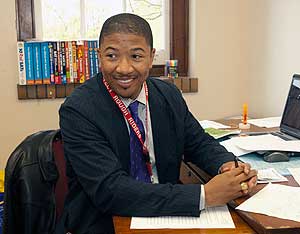Aaron Jennings was unsure of his next move. He had a solid educational background in politics and government and a strong desire to help others, born out of his faith and upbringing, but he was unsure of a career path.
A late-night Internet search gave him unexpected clarity.

“It was my senior year at the University of Virginia, and I was looking for a graduate school that would give me the tools to truly help others,” says Jennings, who graduates May 15 with a master’s degree from the George Warren Brown School of Social Work.
“I stumbled across the Brown School’s Web site and found exactly what I was looking for, a program that stresses the use of evidence-based research to make sure that the help I hoped to give others would have a lasting impact,” he says.
Jennings’ main interest is youth development, particularly educational attainment for African-American males. He began earning valuable experience during his time with the St. Louis Coro Fellows, a leadership training program in public affairs.
Among other projects, Jennings helped St. Louis Public Schools (SLPS) Office of Development create “Project 2010: St. Louis Public Schools College Initiative.” Project 2010 focused on providing college scholarships to low-income, high-potential students from the class of 2010.
“We were able to get 10 schools to agree to give full-tuition scholarships,” Jennings says. “It was great to be able to lay the groundwork for this program.”
| George Warren Brown School of Social Work |
Jennings’ impact on St. Louis did not end with the completion of his fellowship. As part of his practicum, he worked with adolescents in the juvenile justice system. He also became an important fixture at Roosevelt High School in south St. Louis, where he advocated for students and created a dropout prevention program for 25 African-American males.
“America’s future is dependent on the growth of African-American males — we are all linked together,” he says. “My research revealed that in many urban centers, over 50 percent of all African-American males don’t graduate from high school and/or they drop out before the 10th grade.
“African-American males and African-American females have the largest graduation gap of any minority — twice as many females as males graduate. Seeing these statistics and also having a passion for my country, I decided that I had to do something about the dropout problem,” he says.
Jennings’ program, produced in his “Developing Programs” class at the Brown School, features the Saturday Academy, where students learn study skills and participate in personal development workshops; Check and Connect, where Jennings checks in with his students at least twice a week and connects them to necessary resources; and a weekly study hall.
“You would be surprised to see what students will do if they know that someone is there for them,” he says.
The program is seeing measurable success.
“GPAs have gone up,” Jennings says. “I had one student who had straight Fs at the beginning of the school year. His GPA is now 2.857.”
SLPS is working to continue Jennings’ dropout prevention program.
“Aaron is a man on a mission who focuses on how he can uplift the self-esteem and academic performance of African-American males, which in turn does likewise to their female counterparts and America as a whole,” says Jack Kirkland, associate professor and Jennings’ adviser. “His commitment is solid and sincere.”
Outside of the classroom, Jennings served as co-chair of the Brown School’s Student Coordinating Council. He emceed many fund-raising events at the school and worked as a program assistant for WUSTL’s Gephardt Institute for Public Service.
“Aaron is not just a student going through the motions to become a social worker,” says Karen Acton, manager of student programs at the Brown School. “He stands out as a leader and a role model for the youth he works with and his peers.”
Jennings’ long-term goal is to be a federal or state secretary of education. He will take a step toward that goal when he begins work for an agency that focuses on education in his hometown of Washington, D.C. Jennings also is applying for fellowships that will give him higher-level skills and experience.
“My passion is education, and my desire is to be able to create change at a big level,” he says.